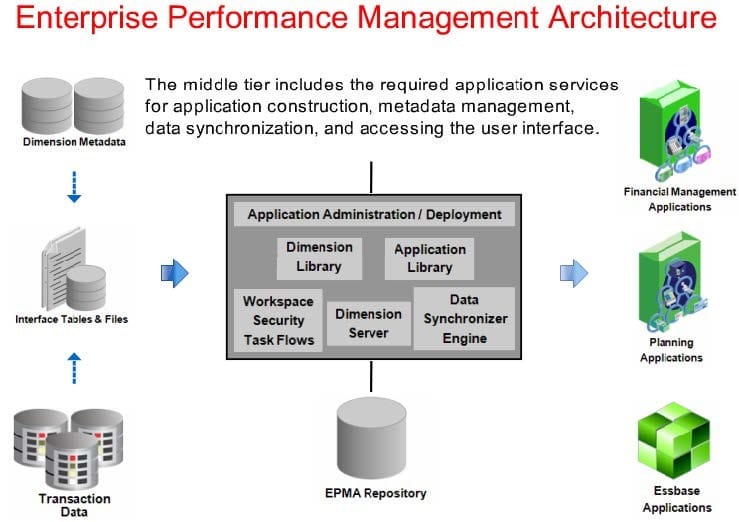Exam Details
Exam Code
:1Z0-533Exam Name
:Oracle Hyperion Planning 11 EssentialsCertification
:Oracle CertificationsVendor
:OracleTotal Questions
:69 Q&AsLast Updated
:Mar 27, 2025
Oracle Oracle Certifications 1Z0-533 Questions & Answers
-
Question 11:
Assuming you have a Period dimension with calendar months rolling to quarters to total years. If you assign the property Time Balance Last to the "Headcount" account member, what will user see for Q1?
A. January's value
B. March's value
C. The total of January+February +March
D. The average of January + February + March
-
Question 12:
Identify the correct set of required dimensions for Planning.
A. Account
B. Entity
C. Version
D. Years and Periods combined into one dimension
E. Scenario
F. Minimum one user-defined dimension
-
Question 13:
As a Planning end user, you need to add additional commentary to your plan, documenting assumptions and other notes.
What are the six available options to add this information?
A. Supporting detail
B. Planning unit annotations
C. Cell text
D. Free form text (if defined by your Planning administrator)
E. Smart Lists (if defined by your Planning administrator)
F. Attach a document to a data form from Workspace (if enabled by your Planning administrator)
G. Financial Reporting Annotations in a Financial Reporting document (against the Planning application)
-
Question 14:
You have a new Planning administrator to manage the Capital Expenditure application. He will assign security for the application as well as maintain dimensions in EPMA, Business Rules in Calculation Manager, and load data via Essbase rules files. He will not need access to other applications. Choose the two valid roles that will address part or this entire requirement.
A. Administrator for the CapEx application
B. Administrator for the Planning Server
C. Provisioning Manager for the CapEx application
D. Planning Calculation Manager for the CapEx application
E. Dimension Editor for the CapEx dimensions
F. Application Manager in Essbase for the CapEx dimensions
-
Question 15:
Identify the two true statements about Enterprise performance Management Architect.
A. If you decide to implement EPMA, all Planning applications must be EPMA-deployed applications.
B. EPMA-deployed applications may either use EAS Business Rules or Calculation Manager in 11.1.1.3.
C. You can create Planning, TM, Essbase, and FDM applications in EPMA.
D. Data can be shared from a Planning application to an FM application within EPMA.
E. EPMA can be used by end users to manage and update member properties such as hierarchies and aliases.
F. In the Dimension Library, you can maintain one full dimension (for example. Account) but filter portions of the dimension for different applications (for example, Revenue accounts. Balance Sheet)
-
Question 16:
You are designing a new Planning application.
Which two requirements dictate multiple plan types in a single Planning application?
A. Multiple currencies are required.
B. Currency rates must be kept in a separate database.
C. Sales are planned by product and channel, and salary expenses are planned by position.
D. Security is applied to the Entity dimension but can differ for users for accounts "sales" and "expenses".
E. You have decided to implement the Capital Expense planning module in addition to PSL budgeting.
F. Data cannot be shared across the Organization dimension.
-
Question 17:
What option contributes to making an Enhanced Calc Script more flexible than a native Essbase Calc Script?
A. Run on Save
B. @CALCMODE function
C. Run time prompts
D. Can be run over the web
E. Substitution Variables
F. Custom Defined Functions
-
Question 18:
Given the following:
Measures (Dense): 40 stored members, 50 total members
Time (Dense): 17 stored members, 17 total members
Scenario (Dense): 2 stored members, 5 total members
Market (Sparse): 100 stored members, 100 total members
Product (Sparse): 500 stored members, 550 total members
How many potential blocks could be created?
A. Potential Blocks = 40 * 17*2
B. Potential Blocks = 40* 17*2*8
C. Potential Blocks = 100 * 500
D. Potential Blocks = 100 * 500 * 8
E. Potential Blocks = 100 * 550
F. Potential Blocks = 100 * 550 * 8
-
Question 19:
Identify the true statements regarding Supporting Detail. Select all that apply.
A. Importing Supporting Detail from Excel is supported.
B. Supporting Detail must be entered cell by cell; entry for multiple columns at once is not possible
C. Supporting Detail can contain a hierarchy with an aggregation of values for that hierarchy.
D. Supporting Detail can be viewed using the Smart View Add-in Essbase Provider.
E. Supporting Detail is stored in Essbase.
-
Question 20:
Fragmentation in an underlying Planning Essbase database that is caused by what two actions?
A. Delete member from a sparse dimension.
B. Delete member from a dense dimension.
C. Renaming a member.
D. Renaming an alias.
E. Submitting data / deleting data frequently.
Related Exams:
1Z0-020
Oracle8i: New Features for Administrators1Z0-023
Architecture and Administration1Z0-024
Performance Tuning1Z0-025
Backup and Recovery1Z0-026
Network Administration1Z0-034
Upgrade Oracle9i/10g OCA to Oracle Database OCP1Z0-036
Managing Oracle9i on Linux1Z0-041
Oracle Database 10g: DBA Assessment1Z0-052
Oracle Database 11g: Administration Workshop I1Z0-053
Oracle Database 11g: Administration II
Tips on How to Prepare for the Exams
Nowadays, the certification exams become more and more important and required by more and more enterprises when applying for a job. But how to prepare for the exam effectively? How to prepare for the exam in a short time with less efforts? How to get a ideal result and how to find the most reliable resources? Here on Vcedump.com, you will find all the answers. Vcedump.com provide not only Oracle exam questions, answers and explanations but also complete assistance on your exam preparation and certification application. If you are confused on your 1Z0-533 exam preparations and Oracle certification application, do not hesitate to visit our Vcedump.com to find your solutions here.
